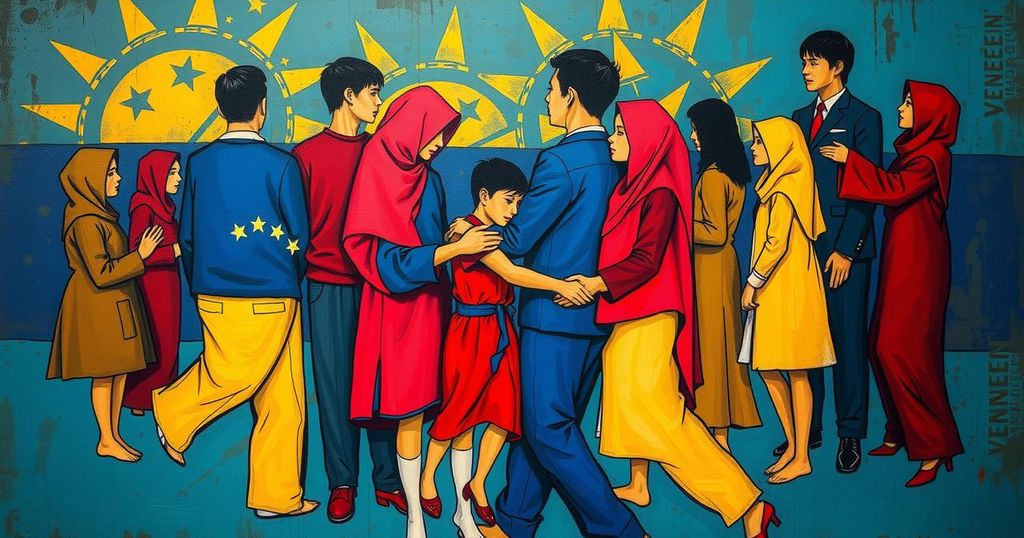World news
ASIA, BIDEN, CATO INSTITUTE, COLOMBIA, CUBA, HUMAN RIGHTS WATCH, JUAN, LATIN AMERICA, MADURO, MEXICO, NATIONAL INSTITUTE OF JUSTICE, NATIONAL SECURITY, NORTH AMERICA, ORGANIZED CRIME, PHILIPPINES, POLITICS, SOCIAL ISSUES, SOUTH AMERICA, STATE DEPARTMENT, TRI, TRICIA MCLAUGHLIN, TRUMP ADMINISTRATION, U.S. ELECTIONS, VENEZUELA
David O'Sullivan
0 Comments
Supreme Court Ruling on Venezuelan Deportations Raises Serious Concerns
The Supreme Court ruling enabling the deportation of 350,000 Venezuelans has sparked significant concern over familial separations and economic impacts. While the Trump administration claims it enhances safety, many argue these TPS holders are essential contributors to society and face dire threats if returned to Venezuela. Experts note that this could lead to broader humanitarian issues.
The recent Supreme Court ruling permitting the deportation of 350,000 Venezuelans is causing concern across the United States. The Trump administration is celebrating the decision, stating it will enhance community safety. However, many argue that this move disproportionately affects innocent individuals who are contributing positively to society. Most of these people are hard-working professionals: restaurant workers, Uber drivers, and caregivers who fill roles many Americans are reluctant to occupy. They are living in the United States under a Temporary Protected Status, which was initially established due to the political and economic crises in Venezuela.
The claims by Homeland Security spokeswoman Tricia McLaughlin, who characterized the ruling as a success for American safety, are met with skepticism. Various studies, including those from institutions like Northwestern University and the Cato Institute, indicate immigrants, on average, commit fewer violent crimes compared to native-born Americans. Thus, the narrative framing immigrants as a threat does not align with statistical evidence.
This recent ruling by the Supreme Court has raised alarm bells, as it could potentially strip legal protections from Venezuelan TPS holders at any time. The Biden administration has labeled Venezuela as a dangerous locale, following a May 12 travel advisory that urged Americans to avoid the country due to rampant crime, civil unrest, and a deteriorating health system. Reports indicate Venezuela’s homicide rate is alarmingly high, surpassing those of countries like Colombia and Mexico.
Human Rights Watch has condemned the ruling, asserting that it places Venezuelan TPS holders in imminent danger of persecution upon their return. Juanita Goebertus, the organization’s Latin America division head, referred to this deportation policy as “a huge act of treason.” Many of those affected actively protested against the Maduro government before fleeing, raising fears they may face detention or even torture if deported.
The situation among the Venezuelan diaspora is one of great apprehension. Helen Villalonga, the founder of the AMAVEX immigrant rights group in Miami, reported a palpable sense of panic among families. Just recently, a family approached her about the peril their 9-year-old U.S. citizen daughter faces should her parents be deported. Villalonga emphasized the absurdity of sending a child to a country deemed unsafe by the State Department.
The narrative that deporting Venezuelans will enhance national safety flies in the face of reality. Many would argue that it actually establishes a climate of fear among immigrant communities, dissuading them from reporting crimes. While there is a consensus that violent offenders should be deported, equating TPS holders with criminality undermines both ethical and economic considerations.
It seems Trump’s policy motivations are more aligned with catering to his support base, which often exhibits xenophobic tendencies, rather than addressing genuine humanitarian or safety concerns. As the nation stands at the brink of a potential humanitarian crisis, one must weigh the broader implications of such a sweeping deportation policy.
In summary, the Supreme Court ruling allowing the deportation of 350,000 Venezuelans is prompting serious debate regarding its implications for American society and its economy. This ruling is seen by many as adverse, especially considering the contributions and legal status of these individuals under the Biden administration’s Temporary Protected Status. The risks posed to deported individuals in the context of Venezuela’s current sociopolitical environment raise further ethical concerns. Overall, it underscores a growing humanitarian dilemma that could affect not just Venezuelans, but the fabric of communities across the United States.
Original Source: www.miamiherald.com




Post Comment